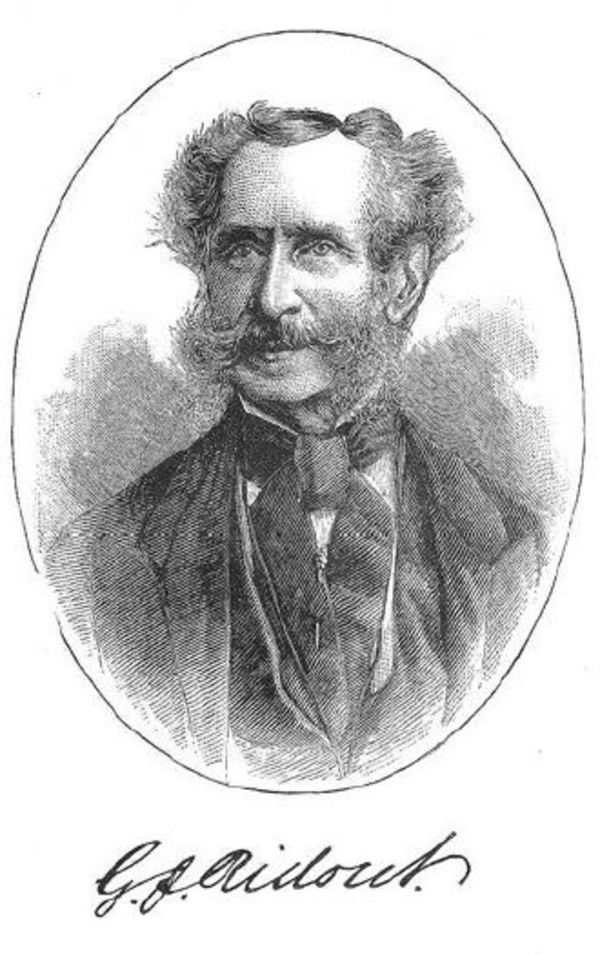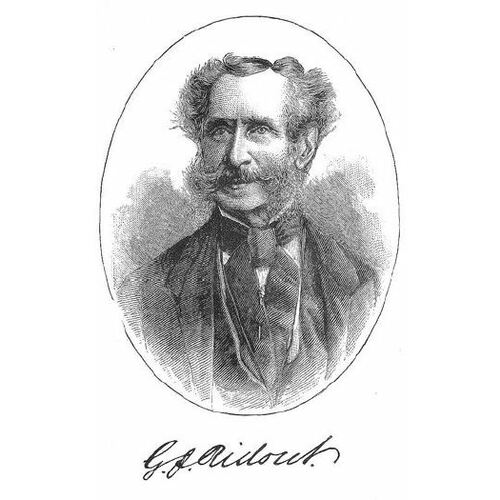
Source: Link
RIDOUT, GEORGE PERCIVAL, merchant and politician; b. Bristol, Eng., 21 Aug. 1807, son of George Ridout and Mary Ann Wright; d. unmarried, in Toronto, Ont., 28 June 1873.
George Ridout, Sr, emigrated from Bristol in 1820, going first to Philadelphia, then in 1826 to York (Toronto), where his uncle Thomas Ridout*, the surveyor general, secured for him a position in the government service. His two oldest sons, George Percival and Joseph Davis*, remained in the United States; by 1826 they were employed there by Tarratt’s, iron and hardware merchants of Wolverhampton, England. G. P. Ridout, after joining Tarratt’s in Philadelphia, had moved to New York, where Joseph Davis joined him. G. P. Ridout moved to York in 1828 and began legal studies. Tarratt’s sent J. D. Ridout to Boston in 1830, but in 1831 he moved on to York. There, in 1832, with the support of Tarratt’s, the two brothers opened Ridout Brothers and Company, wholesale and retail iron and hardware merchants. Wholesaling was just developing in Toronto in the early 1830s, and the Ridouts were the first specialized hardware merchants there. Their mercantile training and British backing, linked to the rapid growth of the market, enabled them to build one of Toronto’s largest hardware houses in the next two decades.
G. P. Ridout soon became active in local politics. A moderate conservative, he often fought with Toronto’s more extreme Tories, including William Henry Boulton and Henry Sherwood*. He captained a company of York volunteers in 1837 and in the 1840s opposed the rebellion losses bill and also British free trade, along with many other Tories and moderates who feared the breaking of the British connection. Nevertheless, he worked energetically in 1841 to elect two Sydenham [Thomson*] Reformers, Isaac Buchanan* and John Henry Dunn*, in Toronto. Three years later he stood for Toronto himself as a moderate supporter of Sir Charles Metcalfe*, but opposition from extreme Tories forced his withdrawal before polling day. In 1844 he was elected president of the Toronto Board of Trade, a post he held until 1852. He now pursued his public career vigorously. He was president of the St George’s Society from 1845 to 1847; in 1851 he secured election to the Toronto City Council and the board of trustees for Toronto public schools and was narrowly defeated when he ran for mayor in 1851.
In 1851 he won a Toronto seat in the assembly, where he acted as an independent Conservative and took a particular interest in issues concerning Toronto’s trading community. Thus he sought amendments to the Upper Canada assessment act, the Grand Trunk Railway charter, and the usury laws; and he opposed Francis Hincks*’ tariff and efforts of Montreal interests to promote a commercial empire focussed on Montreal. He also advocated the abolition of Sabbath labour. In the 1854 election, though he won the support of Conservative businessmen, he found this too narrow a political base and was defeated in Toronto by two other Conservatives, John George Bowes* and John Hillyard Cameron. He did not seek election again.
Unlike his brother, Joseph Davis, and many other Toronto merchants in these years, Ridout did not play a central role in forming new companies, but in 1853 he did become governor of Toronto’s British America Assurance Company, a post for which his mercantile and political positions qualified him well. He retired from the hardware business in 1866, leaving his brother to carry it on, and devoted himself wholly to the insurance company. In 1871 he became its manager as well and held both posts until his death.
Canada, Province of, Legislative Assembly, Journals, 1852–53. [Hugh Scobie], “Letters of 1844 and 1846 from Scobie to Ryerson,” ed. C. B. Sissons, CHR, XXIX (1948), 393–411. Town of York, 1815–1834 (Firth). Globe (Toronto), 1850–60. Rowsell’s city of Toronto and county of York directory, for 1850–1 . . . , ed. J. Armstrong (Toronto, 1850). Brown’s Toronto general directory, 1856 . . . (Toronto, 1856). Brown’s Toronto general directory, 1861 . . . (Toronto, 1861). Hist. of Toronto and county of York, II, 137–39. D. C. Masters, The rise of Toronto, 1850–1890 (Toronto, 1947). Douglas McCalla, “The commercial politics of the Toronto Board of Trade, 1850–1860,” CHR, L (1969), 51–67.
Cite This Article
Douglas McCalla, “RIDOUT, GEORGE PERCIVAL,” in Dictionary of Canadian Biography, vol. 10, University of Toronto/Université Laval, 2003–, accessed April 28, 2025, https://www.biographi.ca/en/bio/ridout_george_percival_10E.html.
The citation above shows the format for footnotes and endnotes according to the Chicago manual of style (16th edition). Information to be used in other citation formats:
| Permalink: | https://www.biographi.ca/en/bio/ridout_george_percival_10E.html |
| Author of Article: | Douglas McCalla |
| Title of Article: | RIDOUT, GEORGE PERCIVAL |
| Publication Name: | Dictionary of Canadian Biography, vol. 10 |
| Publisher: | University of Toronto/Université Laval |
| Year of revision: | 1972 |
| Access Date: | April 28, 2025 |



